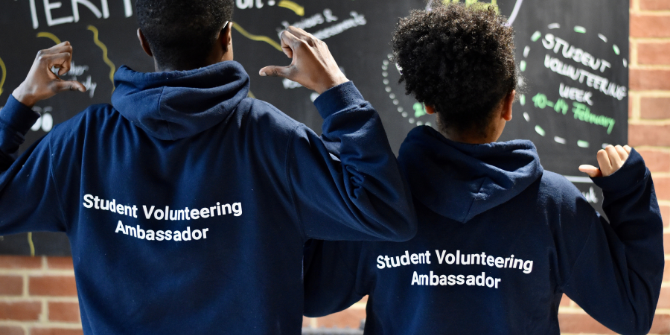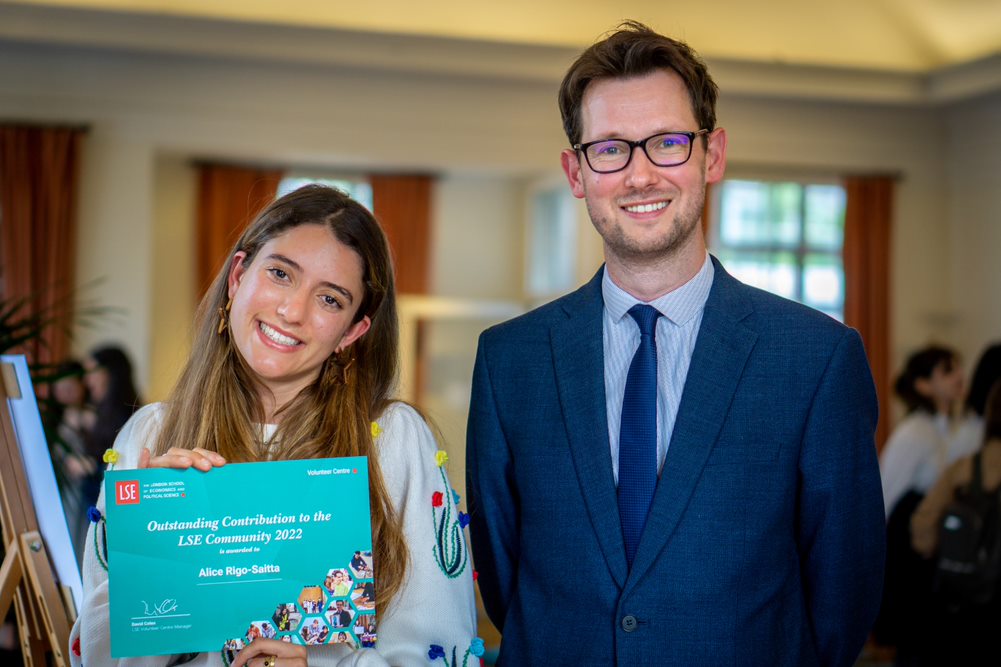We’ve just released the results of our annual student volunteering survey focusing on the 2021/22 academic year. 2105 students responded, giving us insights into all of their volunteering activities and the thoughts of those that don’t volunteer. We put students at the heart of everything we do in the Volunteer Centre so listening to their opinions is crucial to making improvements and understanding the impact of volunteering as part of student life at LSE.
So what did we learn? How is the LSE community comparing to national levels of volunteering? What can we do better?
1. Altruistic motivations are at their highest ever levels
As in previous years altruistic motivators are the highest for students. However, improving things has had its highest ever response rates from students with 95% saying this is a motivator for them. Giving back to society and my personal values also have the highest ever results.
Personal development motivators are still important too, such as: seeking careers related outcomes, making friends and enhancing learnings from their LSE course but all of these are some way behind the altruistic motivators.

2. LSE students are dedicated but numbers are down
At 31% the number of LSE students who have volunteered is at it’s lowest level since we started recording this data. This matches national trends with COVID being the biggest barrier to those starting volunteering. Additionally the Volunteer Centre wasn’t able to run big recruitment events such as the LSE Volunteering Fair or Charity Tuesdays throughout the 2021/22 academic year.
Only, 26% of 1st year undergraduates volunteered in the 2021/22 academic year, down from 39% in 2019/20 and 31.2% in 2018/19. Postgraduates student volunteering stayed broadly similar to previous years.
It should be noted that those that do volunteer are very committed. 40% of students that volunteer do so on a weekly basis and 49% of those that volunteer do it all year round.
We have also seen an increase in the number of students who volunteered for the first time in their life at LSE. This has risen to 29% of volunteers, up from 25% in 2020/21.
3. Increased numbers of students feeling time pressured
The biggest reason, by some distance, given by students who don’t volunteer is not enough time due to the pressures of study. This has reached it’s highest ever level with 90% of students who did not volunteer saying this. I’m not sure how to get involved has reduced from 37% to 31% but is still too high. This is despite the Volunteer Centre increasing resources in marketing and communications over the past two years and adding in new programmes to support students in their volunteering. Our belief is that during the pandemic students have struggled to hear from the Volunteer Centre, with so many competing in the digital space. The lack of opportunity to speak to students face-to-face on campus has been an incredibly difficult barrier to overcome.

4. Volunteering improves all aspect of the LSE experience
The headline figure is that over 70% of students who volunteer say it improves their LSE experience. However, we also ask several supplementary questions about three more specific areas which volunteering has a big impact on:
Personal life
Almost 60% who volunteer say their range of friendships has increased, almost 50% say their general well-being has increased, over 45% say their sense of being part of the university has increased and 62% say their sense of feeling part of their local community has increased. In a big city like London it can be difficult for some to make friends and feel like they are part of a community. Volunteering plays a unique role in giving people a stake in society, ownership of issues they care about and is a way to break down barriers.
Education, learning and confidence
38% of those that volunteer say knowledge of their degree subject increased. 74% say their understanding of other people has increased and 73% feel their confidence in their own abilities has increased. Volunteering acts as a crucial bridge between classroom learning and real life experiences putting those theories in to practice.
Future career prospects
Students report that communication, organisational, decision-making, and team-working skills will all have improved as a result of volunteering. They are also more willing to try new things and 67% feel the skills they think employers are looking for have improved. All of these results indicate volunteering helps create well-rounded individuals ready to start their careers once they leave LSE.
5. We have excellent charity partners
The pandemic has been incredibly hard for charity partners and the opportunities that they are able to offer. However, our charity partners have adapted and bounced back to ensure that our students can contribute to their important work. We appreciate these opportunities and the trust they put in our students. The fact that 92% of students who volunteer say they would recommend it to a friend indicates what incredible volunteer managers we work with.
So where does this leave us?
We believe that we are starting to see a bigger divide between those who do volunteer, and all the benefits they receive, and those who don’t. The Volunteer Centre will continue to offer varied opportunities and programmes to reach those that need our support. We’re also hopeful that with campus being much busier that we will see an increase in our reach. We’ve already had representation during Welcome Week, run a volunteering fair with over 400 students in attendance and re-introduced Charity Tuesdays on campus where a different partner joins us to meet students each week.
We know that we can reach more students, and more importantly they want to engage (less than 5% say they just don’t want to volunteer), but it isn’t easy. A bigger voice and presence on campus is essential, alongside programmes and opportunities that students can engage with.
If you’re not currently volunteering because you’re not sure how to get involved the following can help:
- visit our website to learn more about what we do
- book a one-to-one appointment to discuss how we can help you find a suitable role
- browse one-off and ongoing opportunities on CareerHub
Volunteering has the potential to transform a university experience for LSE students and we look forward to inspiring many more to get involved in the upcoming academic year.
If you work with young volunteers, does our analysis match what they tell you? Get in touch and add to the debate on social media.





